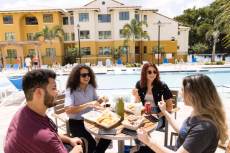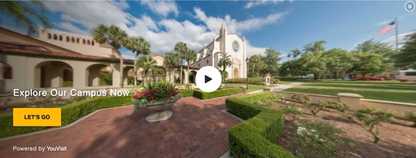
Classical Studies
To understand where we’re going, we must reflect on where we’ve been—even if that means going all the way back to the beginning. Classical studies is the original liberal arts degree, combining aspects of art, history, archeology, literature, and philosophy into a comprehensive look at the cultures of the ancient Mediterranean.
You’ll have the opportunity to study artifacts up close through local museum collections or right at the source in places like Athens and Rome. You’ll put yourself in the shoes of Greek senators as well as servants and slaves in order to understand the foundations of our democracy. And with a major emphasis on developing critical thinking and research skills, you’ll be prepared for virtually any industry. Our students have gone on to study law, teach Latin, research lost cities, and serve as international business leaders.
Why Study Classical Studies at Rollins
- 1
Room to Explore
Thanks to a truly interdisciplinary approach, you’re free to follow your interests. A degree in classical studies lets you reach out and touch history through the study of art, theater, literature, philosophy, and more.
- 2
Experiential Learning
Whether it’s examining an ancient sarcophagus up close at our very own Cornell Fine Arts Museum or staging a true-to-life Roman banquet to explore notions of class and privilege, studying the classics at Rollins doesn’t happen in overcrowded lecture halls.
- 3
Personalized Attention
At Rollins, mentorship is the heart of everything we do. Small class sizes allow our expert faculty to get to know your goals and interests, and because classical studies is such a specialized track, your peers become your tribe.
Interested in Studying Classical Studies at Rollins?
Sign up to receive more info about what it’s like to be a classical studies major at Rollins and to connect with a professor.

“My love for teaching and science blossomed during my classical studies and biochemistry/molecular biology double major at Rollins. The opportunities beyond the classroom were hugely beneficial in my transition to the PhD program in genetics at Harvard. Even today, the hands-on experiences at Rollins influence my approach with undergraduates because they were so effective.”

Rollins Classical Studies Careers
Rollins classical studies grads are making tomorrow happen at some of the world’s most innovative companies and prestigious institutions.
-
Melanie Ng ’15 ’16MBA
Senior Financial Analyst, Berkadia
-
Mary Neville ’13
Latin Department Head, St. Thomas’ Episcopal School
-
Mallory Pigmon ’15
Administrative Coordinator, University of Central Florida
-
Jenna Bittenbender ’13
Conservator, Imperial War Museums
-
Hilary Serra ’08
Project Manager, Yamhill Community Care
Real World Experience
From internships to research, Rollins classical studies students hone their skills in the real world.

Experience Rollins IRL
There’s no better way to get a feel for life at Rollins than by scheduling a campus tour.
Schedule a VisitPopular Courses
The ancient Mediterranean encompasses a wide range of cultures, belief systems, and social hierarchies. By communing with great thinkers of the past, you’ll develop critical thinking skills to last a lifetime.
CLS 103 The Greeks and the Good Life
Dive into the question at the center of Greek moral theory: What constitutes a good life? Explore what that meant for the ancients through studying Greek literature, philosophy, and history before turning the lens inward and engaging in philosophical self-exploration.

ARH 310 Archaeology of Food and Dining in Antiquity
Food is the lens through which you’ll study key aspects of Roman society. As a final project, you’ll stage a mock banquet where you must demonstrate knowledge of period-specific decorum.
THE 241 Classical Theatre
In ancient Greece and Rome, dramatic stagings formed a key component of storytelling traditions. Examine the many different ways classical theater served as a way for community leaders to enforce myths and traditions.
HIS 120 Decade of Decision
Explore the politics, power, and betrayal that define Caesar’s Rome through a combination of writing, research, and role play.

ARH 217 Art and Archaeology of the Roman Empire
You probably have more in common with the average Roman citizen than you think. Discover just what life was like for the men and women of Rome through the study of the art and artifacts they left behind.


Beyond the Classroom
Applying Knowledge Rollins is home to the only teaching museum in Central Florida, the Cornell Fine Arts Museum, which houses an impressive collection of artifacts and antiquities. You’ll have the opportunity to curate collections, serve as a docent, and conduct original research, all without leaving campus.
Study Abroad Contemplate the origins of democracy while standing on the Acropolis. Explore the lives of Mycenaeans and Minoans as you wander the streets of Crete. Gaze upon Roman frescoes and ancient graffiti in Pompeii. With ample opportunity to participate in study abroad programs and summer field studies, the Classical world is well within reach.
Classics Club The Rollins Classics Club brings together enthusiasts from across the humanities to participate in enrichment activities, mock trials, debates, and performances rooted in ancient traditions.

Dive Into Classical Studies at Rollins
The core of our Classical Studies program is language study, with Latin and Ancient Greek available, accompanied by an interdisciplinary exploration of the Hellenic and Roman worlds through archaeology, history, and philosophy.
What You Will LearnExpert Faculty
You and your professors will know each other personally very quickly, which means you’ll be mentored by the very PhD-level instructors who have designed the classical studies classes. They take pride in empowering students and guiding you on your Rollins journey.
Classical Studies Program
Telephone:407.646.2602
-
Robert Vander Poppen, PhD
Department Co-Chair, Associate Professor of Classical Art & Archaeology
Research interests: Classical art, archeology, food in the ancient world, cultural tensions between imperial powers and native communities
-
Scott Rubarth, PhD
Faculty Director of Classical Studies, Associate Professor of Classical Philosophy
Research interests: Philosophy and religion
-
Hannah Ewing, PhD
Associate Professor of History
Research interests: Monasticism in the Byzantine Empire and early Christianity
-
Julia Maskivker, PhD
Associate Professor of Political Science
Research interests: Theories of justice, global ethics, and social and economic citizenship
-
Marianne DiQuattro, PhD
Theater Literature & History, Associate Professor
Research interests: Intersection of dramatic literature and phenomenology, theatre and disability















